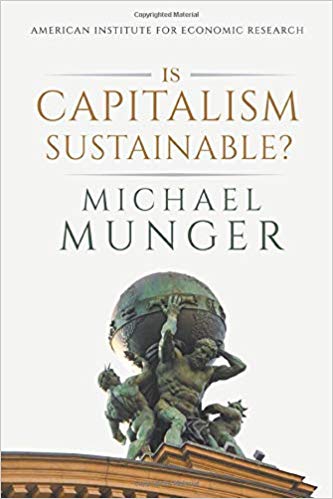The Best Lack Conviction; The Worst Have Passionate Intensity
Human beings have contradictory impulses. On the one hand, we want to be “free”; on the other, we want to be led, and by a powerful and charismatic leader. Howard Nemerov put it puckishly but succinctly: “Why are stamps adorned with kings and presidents? That we may lick their hinder parts and thump their heads.”
When teaching about leadership in class, I always assign the First Book of Samuel, from the Old Testament. The story is about a debate over the nature of law, obligation, and leadership. Israel was at the time “ruled” by the Mosaic law, interpreted by judges. But the people had decided they wanted a king.
10 Samuel told all the words of the Lord to the people who were asking him for a king.
11 He said, “This is what the king who will reign over you will claim as his rights: He will take your sons and make them serve with his chariots and horses, and they will run in front of his chariots.
12 Some he will assign to be commanders of thousands and commanders of fifties, and others to plow his ground and reap his harvest, and still others to make weapons of war and equipment for his chariots.
13 He will take your daughters to be perfumers and cooks and bakers.
14 He will take the best of your fields and vineyards and olive groves and give them to his attendants.
15 He will take a tenth of your grain and of your vintage and give it to his officials and attendants.
16 Your male and female servants and the best of your cattle and donkeys he will take for his own use.
17 He will take a tenth of your flocks, and you yourselves will become his slaves.
18 When that day comes, you will cry out for relief from the king you have chosen, but the Lord will not answer you in that day.”
19 But the people refused to listen to Samuel. “No!” they said. “We want a king over us.
20 Then we will be like all the other nations, with a king to lead us and to go out before us and fight our battles.”
Yeah, right. That’s how it works: leaders are out front, fighting our battles, while we rest in comfort and security. In fact, there have been nearly 5,000 Americans who have died, and more than 30,000 who were wounded, in Iraq alone, 
When you look at the “greatness rankings” generated by historians of the American system, you see that the eugenicist and famed racist Woodrow Wilson and the insanely genocidal Andrew Jackson both rank well above such paragons as Calvin Coolidge who presided over prosperity and left the country peaceful and content.
In a recent book on prudence, Edmund Burke, and Abraham Lincoln, political scientist Greg Weiner points out:
[Such rankings confuse] greatness with change and the equation of change with power. This formulation leaves inadequate room for what Burke called the queen of political virtues — prudence. The beauty — the excellence, I would argue — of Burkeanism, like baseball, often consists in the negative space, the prudent prevention of action, or in the careful calibration of action to circumstance, rather than in the volume of activity alone. This is difficult to capture and, crucially, to communicate. Historians do not write books about what did not happen; prudence is not the stuff of which legacies are made. It is easier simply to celebrate the daring man of action, the hitter who racks up the runs.
I’ll admit, he had me at “baseball.” But it’s a deep point. Weiner argues for prudence as the first and most important of excellent qualities of the good leader. His choice of Burke and Lincoln as examples is important, because each was active, even risk-taking. But that’s the point; prudence is often caricatured as a justification for inaction. Leadership and prudence may require bold action, but we mustn’t simply equate bold action with good leadership.
In effect, Weiner’s claim is that the prudent leader is bound by habits, rather than principles. There is no one principle — as Adam Smith also pointed out, in skewering the “Man of System” — that, slavishly followed, produces good results in all contexts. Instead, the habit of reflection and the application of informed pragmatism combine to direct the excellent leader. Weiner cites a provocative quote from de Tocqueville, one I had not seen before. The fuller quote, in context, is this:
There is a practical and militant politics that struggles against the difficulties of each day, adapting to the variety of incidents, providing for the passing needs of the moment, and calling to its aid the ephemeral passions of contemporaries.
This is the art of government.
The art assuredly differs from the science, practice is often removed from theory, I do not deny it; I would go even farther, if desired, and make this concession, admitting that, in my judgment, to excel at one is no reason at all to succeed in the other. I do not know, gentlemen, whether, in a country that has counted among its great publicists and its great writers so many eminent statesmen, it is even permitted to say that to make fine books, even on politics or things connected to it, prepares one quite poorly for the government of men and the management of affairs.
But then where are we to look for leadership? I have offered quotes, or rankings, that seem to claim people overvalue overweening, ambitious action but also knowledge without skill. The point is not that there is a correct answer to “What kind of strong leader do we want?” The answer is that “we” don’t want a strong leader at all; it doesn’t turn out well.
F.A. Hayek, in his essay “Why the Worst Get on Top,” chapter 10 of The Road to Serfdom, thought the process of seeking strength but achieving only oppression was a product of human nature itself. Hayek identified what I think of as the political version of the messiah complex: concentrated political power is good; we just need good people to lead us. As Hayek put it, this belief rests on the heartbreakingly persistent belief “that the most repellent features of the totalitarian regimes are due to the historical accident that they were established by groups of blackguards and thugs.” All we need to do is have a powerful system, but run by highly moral and altruistic leaders.
Next time will be different, we tell ourselves over and over, but it never is different. Hayek believed, and the 75 years that have passed since he wrote The Road to Serfdom have only strengthened his case, that oppression is intrinsic, even inevitable, in systems with concentrated power. “Good people,” even if they exist, are not enough.
Just as the democratic statesman who sets out to plan economic life will soon be confronted with the alternative of either assuming dictatorial powers or abandoning his plans, so the totalitarian dictator would soon have to choose between disregard of ordinary morals and failure. It is for this reason that the unscrupulous and uninhibited are likely to be more successful in a society tending towards totalitarianism. Who does not see this has not yet grasped the full width of the gulf which separates totalitarianism from a liberal regime, the utter difference between the whole moral atmosphere under collectivism and the essentially individualist Western civilization.
Hayek’s argument rests on three claims. He contrasts the liberal society, which allows disagreement but which is hamstrung by an inability to reach collective and binding consensus on major questions, with “collective” society, which strives to reach and impose just such a consensus. That insistence, both on collective sensibility and the practical achievement of consensus to be imposed on the society, “is not likely to be formed by the best but rather by the worst elements of any society. By our standards the principles on which such a group would be selected will be almost entirely negative.”
Hayek’s three claims can be summarized, though the argument is better read in full. First, highly educated and intelligent people have variegated and refined tastes, and are difficult to shoehorn into a simplistic consensus. Consequently, totalitarian regimes, left and right, are generally concerned with the problem of controlling intellectuals and limiting their power. Hayek claims that people with simple, easily summarized, views are more malleable as tools for the collective sensibility. For Hayek:
This does not mean that the majority of people have low moral standards; it merely means that the largest group of people whose values are very similar are the people with low standards. It is, as it were, the lowest common denominator which unites the largest number of people. If a numerous group is needed, strong enough to impose their views on the values of life on all the rest, it will never be those with highly differentiated and developed tastes — it will be those who form the “mass” in the derogatory sense of the term, the least original and independent, who will be able to put the weight of their numbers behind their particular ideals.
The potential dictator or demagogue has a problem, however: even if the group of “docile and gullible” is the largest group, it may not be of itself large enough to establish consensus. And that leads to the second problem: a substantial proportion of the population may have no beliefs at all, at least in the sense of considered and integrated systems of moral commitments. To expand the consensus to be broad enough to achieve the collective aims of the dictator, it is necessary to recruit from those who have
no strong convictions of their own but are prepared to accept a ready-made system of values if it is only drummed into their ears sufficiently loudly and frequently. It will be those whose vague and imperfectly formed ideas are easily swayed and whose passions and emotions are readily aroused who will thus swell the ranks of the totalitarian party.
The third and final claim is the importance of what some psychologists call “the other,” the simplistic explanation for why individuals or the society have fallen short of their expectations and potential. All appeals to the “need” for concentrated state power share an essential element: a narrative that attributes the failures and shortcomings of the society to an enemy. As Hayek puts it:
It seems to be almost a law of human nature that it is easier for people to agree on a negative programme, on the hatred of an enemy, on the envy of those better off, than on any positive task. The contrast between the “we” and the “they”, the common fight against those outside the group, seems to be an essential ingredient in any creed which will solidly knit together a group for common action. It is consequently always employed by those who seek, not merely support of a policy, but the unreserved allegiance of huge masses. From their point of view it has the great advantage of leaving them greater freedom of action than almost any positive programme. The enemy, whether he be internal like the “Jew” or the “Kulak”, or external, seems to be an indispensable requisite in the armoury of a totalitarian leader.
I write these words while I am visiting the Cevro Institute, in Prague, in the Czech Republic. Viewing the U.S. from afar, and Europe from much closer, it is hard not to notice the impulse that seems to be shared by so many nations at once, the desire for the “strong man,” the leader who will set things right and put “paid” to all those who are oppressing us. The problem is not in ourselves, or in failed policies; the problem lies in our enemies and their schemes to bring us down.
But that view of problems, and so of solutions, has never turned out well. It’s just a sign of how pathological a reliance on politics as a solution can be. Those of us who argue for decentralized solutions, even with all the imperfections of markets and local groups, have history on our side. My own mind often turns to the verses from William Butler Yeats, who wrote about the subject in 1919 with an almost otherworldly prescience:
Turning and turning in the widening gyre
The falcon cannot hear the falconer;
Things fall apart; the centre cannot hold;
Mere anarchy is loosed upon the world,
The blood-dimmed tide is loosed, and everywhere
The ceremony of innocence is drowned;
The best lack all conviction, while the worst
Are full of passionate intensity.










